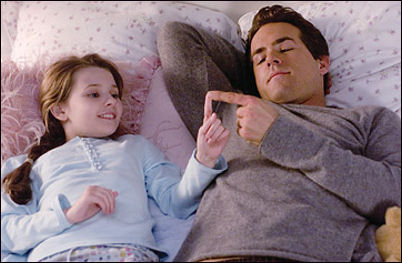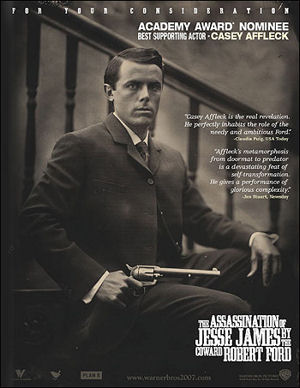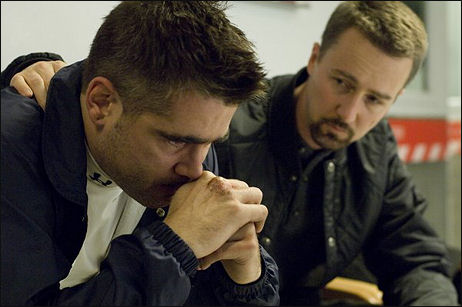The red-band trailer for David Gordon Green and Judd Apatow‘s Pineapple Express (Columbia/Sony, 8.8.08). Seth Rogen, James Franco, Bill Hader, James Remar, Gary Cole, Amber Heard and Rosie Perez costar.
Clinton’s do-or-die strategy
My 9:01 am comment that “my sensings are telling me that Hillary and her campaign team are going to scrap and claw and take everyone down to hell“? Boston Globe‘s “Political Intelligence” columnist Foon Rhee wrote earlier today that Clinton “will not concede the race to Obama if he wins a greater number of pledged delegates by the end of the primary season, and will count on the 796 elected officials and party bigwigs to put her over the top, if necessary, said Clinton’s communications director Howard Wolfson.”
Forcing the issue
Diego Pillco, the admitted murderer of director-actress Adrienne Shelley, has passed along some particulars. Manhattan district attorney Robert Morgenthau says the 11.1.06 tragedy resulted from Shelley catching Pillco “stealing her wallet,” which led to her reaching for the phone to call police “but [Pillco] grabbed it and a fight ensued. He covered the victim’s mouth and nose with his hand until she passed out. He then took a sheet, choked her to death, and made it look like a suicide.”
What a ghastly sequence of events. Awful, horrific…but I have to say something. If there was any question about the basic character of a perpetrator, I would never pick up a phone in order to call the cops with the perp standing a few feet away. I’d never do this because it forces the offender to make a decision — run for the hills or stop the phone call from being made. I’d like to think that most people aren’t violent or sociopathic or confrontational, but a certain percentage are. Pick up the phone and you’re basically gambling that the perpetrator won’t try to take the phone away or physically overpower you or worse.
I would never take that chance if I was a smaller-framed woman. I would get the bad guy to leave the apartment or I would leave myself and then I’d call the cops.
A terrible, terrible thing, this. Reading this story made me go back to it.
Obama Response Ad (2.14)
Just another tit-for-tat ad, but the speed of it is pretty incredible. It’s a response to very recent Clinton ad aired for the Wisconsin market, challenging Obama to debate her prior to the 2.19 primary there. 24 or 48 hours later, wham…the Obama team is right back at her.
Corliss on “Definitely Maybe”
“It’s an odd thing, but in recent years, just about every movie that attempts a sophisticated take on romance, has turned out to be strained and witless. All the successful recent comedies (The 40 Year Old Virgin, The Wedding Crashers and Knocked Up, to name three) have tended toward the raunchy end of the spectrum. It’s as if Hollywood’s wise guys have recognized that middle-class American life is just too complicated, perhaps even too inherently miserable, to get an intelligent handle on.

“You can’t quite treat [modern relationships] as a tragedy but you can turn to its first cousin — farce — and have some profitable fun with it. And who can blame them? Or us, for the benumbed state that something like Definitely, Maybe leaves us in.” — from Richard Corliss‘s 2.14 review in Time.
Late to the table
Late to the table but in complete agreement with Sasha Stone and Kris Tapley that this Assassination of Jesse James by the Coward Robert Ford ad on behalf of Best Supporting Actor nominee Casey Afleck is perhaps the best of its kind seen all season. In no small part because it’s in keeping with the aura and tone of the film itself.

It would take four to six hours of calling the Sovet Republic of Warner Bros. to begin to get some kind of answer about who the creative hands were so let’s not, but sincere congrats to whomever the geniuses are.
Why on God’s green earth?
“Seventy percent of the country is against the Iraq War now,” Young Turks co-host Cenk Uygyur has wrote today. “A great majority of American believe it was a mistake to go into Iraq in the first place. With a country that is this united against the war, are we really going to have two presidential candidates that voted for the Iraq War?
“If Hillary Clinton wins the Democratic primary, both of the major party candidates will have been wrong on the war. Why? Why on God’s green earth would we do that?”
Oscar telecast presenters
So far, the scheduled Oscar show presenters are Alan Arkin, Jennifer Hudson, Helen Mirren, Forest Whitaker, Amy Adams, Jessica Alba, Cate Blanchett, Josh Brolin, Steve Carell, George Clooney, Penelope Cruz, Miley Cyrus, Patrick Dempsey, Cameron Diaz, Colin Farrell, Harrison Ford, Jennifer Garner, Tom Hanks, Anne Hathaway, Katherine Heigl, Jonah Hill, Dwayne Johnson, Nicole Kidman, James McAvoy, Queen Latifah, Seth Rogen, Martin Scorsese, Hilary Swank, John Travolta, Denzel Washington and Renee Zellweger.
New numbers
Definitely Maybe has been tracking decently among women. The general numbers are 64, 32 and 11, but the first choice number is in the teens among women. (Keep in mind there’s an extra President’s Day holiday day on Monday.)
Doug Liman‘s allegedly painful Jumper — almost certainly a one-weekend phenomenon — is still the #1 attraction. The Spiderwick Chronicles is running at 75, 24 and 5. Step Up 2 The Streets is a 16 first choice. All four films are going to do at least decently….no wipeouts.
Vantage Point will do decent business when it opens on 2.22. The most popular March 7th release will be Roland Emmerich‘s 10,000 B.C., which is running at 57, 35 and 6…heavily male. The Bank Job is running at 20, 16 and 1…nothing. College Road Trip is tallying at 58, 25 and 2.
O’Connor replies
I received a reply this morning from director Gavin O’Connor regarding an item I wrote eight days ago (on 11.5) about Pride and Glory, an Ed Norton-Colin Farrell cop drama that’s been done since last November but has been bumped by New Line into an ’09 release.

I wrote that “you can tell from the trailer that Pride and Glory is a little boiler-platey, perhaps a little too emphatic and histrionic.” I also said that “my general motto is that any New Line film that costars Noah Emmerich (brother of production chief Tobey Emmerich) is a potential problem” but that “there doesn’t seem to be anything to fear from O’Connor, who did a first-rate job with ’04’s Miracle.”
O’Connor said he was writing “to introduce myself and thank you for the kind words about Miracle and set the record straight about Noah Emmerich and your insight into the film’s trailer. For the record, I had to fight tooth and nail to get Noah in my film. Tobey Emmerich wanted me to cast a star, someone who brought overseas name value to the project, and in no way wanted Noah in the movie, and was completely immovable on the subject for a long time.
“I cast Noah in my first film, Tumbleweeds, and also Miracle — he played the assistant coach. He’s a great actor, truly underrated, and one of my favorites. After a long, hard fought battle with Tobey, he finally relented, realizing that I wasn’t going to take no for an answer. When you see Noah’s work I believe you’ll understand why I pressed so hard to cast him in the film. His portrayal of the character is riveting and the complexity and unflinching honesty he brought to the role speaks for itself.
“I had a conversation with Todd Field about his experience working at New Line, and we shared a similar war story regarding Noah. I’m sure you know, Todd cast Noah in Little Children, and he too had to battle Tobey to get him in the film. Todd is a huge fan of Noah’s and expressed that to Tobey. Once again, Tobey resisted, wanting a bigger name in the film, someone with more overseas value, etc. Todd dug in his heels and Tobey finally relented.
“I offer you this information because it’s unfair to presume that Noah gets cast in New Line films because he’s Tobey’s brother. If anything, it works against him, requiring filmmakers to duke it out with the studio on his behalf. And we do that because of the high regard we have for Noah as an actor.
“If anything, its a coincidence that Todd and I, both big fans of Noah’s work, happened to be making our films at New Line. We would have cast him at whatever studio was financing our films.
“It seems to me also unfair to judge my film before you’ve seen it. You’re summarizing the entirety of the film based on a two-minute trailer. I invite you to experience the film in its full breadth and depth, and if after that you still feel that it’s boiler-platey and histrionic, I’ll welcome that critique, and respect your opinion. But until then, in fairness to me as the creator of the film, it would be very much appreciated if you would reserve judgment.
“I’ve been trying to realize this movie for over seven years, and though an amazing experience making the film at New Line, it has now become heartbreaking, watching it get caught up in corporate maneuvering, where bookkeeping seems to take precedent over filmmaking. My film is living in some form of studio purgatory, so it hurts to read negative comments about it before its ever been released.
“I write this letter to you from my heart. With no malice intended. Grounded in humility and sincerity. I hope its received in the same manner. With respect and a handshake, Gavin O’Connor.”
Wells reply: Thanks and point taken. I’m well aware that trailers sometime do a disservice to the film they’re supposed to be selling in a positive way. I’d love to have a chance to see Pride and Glory sometime before ’09. Thanks for writing and again, great job on Miracle.
What’s going on here?
The New Hampshire and California primary numbers were so ridiculously off that pollsters are generally thought to be operating out of bounds these days with a gravely flawed methodology, to put it faintly. This notion seems to be reenforced by two strongly divergent polls that came out today.
A Quinnipiac poll that has Hillary Clinton at 55 to Barack Obama‘s 34 in Ohio, and Clinton ahead of Obama in Pennsylvania by 52 to 36. How the hell does that square with those good Virginians giving Obama such an overwhelming majority two days ago with Obama dramatically cutting into Hillary’s core support base? How can there be more than a 45-point difference between these Ohio/Pennsylvania numbers and the final Virginia tallies? Has Virginia been invaded by aliens from the planet Trafalmadore, or have they landed their space ships in Pennsylvania and Ohio?
There’s also a just-released Rasmussen Reports daily poll showing Obama with a national double-digit lead over Clinton with 49% of likely Democratic primary voters and only 37% standing by Hillary. The “most stunning” aspect of the Obama surge is that “he now leads 46% to 41% among women. Clinton retains a lead among the narrower subset of white women, but her lead in that vital demographic is down to just three percentage points.”
Either the pollsters are drunk or on drugs, the people they’ve spoken to are drunk or on drugs or crazy, or these polls simply weren’t conducted on the same planet. There’s no fourth explanation.

